Overwintering peppers isn’t very hard, and it’s a great way to keep your favorites year after year.
In this post, I will show you how to keep them as live or dormant plants. You’ll also get tons of tips to ensure your pepper plants survive the winter.
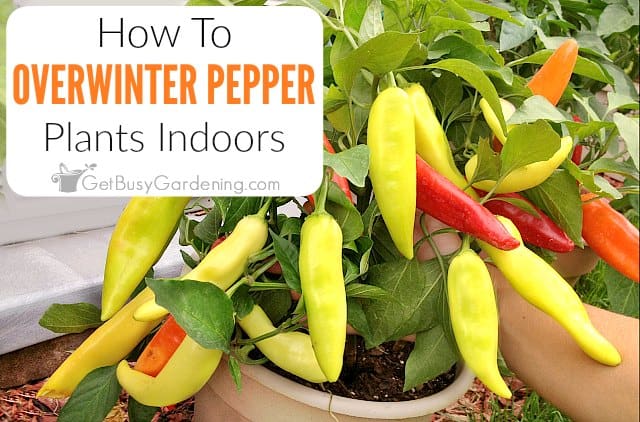
I started overwintering my pepper plants indoors a few years ago out of frustration. Every year I start all of our peppers from seed.
Our summers are short, and it takes forever for them to become mature plants. Then, just when they’re looking amazing, and starting to produce a ton, frost kills them off.
I love growing peppers! So, instead of letting them all die outside, I overwinter them indoors to keep them for next year. And I’ll show you exactly how to do it too.
Are Pepper Plants Annuals Or Perennials?
You’ll always find peppers for sale in the vegetable section in the spring, and most people grow them as annuals.
However, they are actually tender perennials that can survive for years in warm climates.
Overwintering peppers outdoors will work in a mild climate where the temperature stays above freezing. But if you live in a cold climate like I do, then you must bring them indoors.
The good news is, it’s really not that hard to keep them through the winter, and there are three methods you can try!
Related Post: How To Overwinter Plants: The Complete Guide
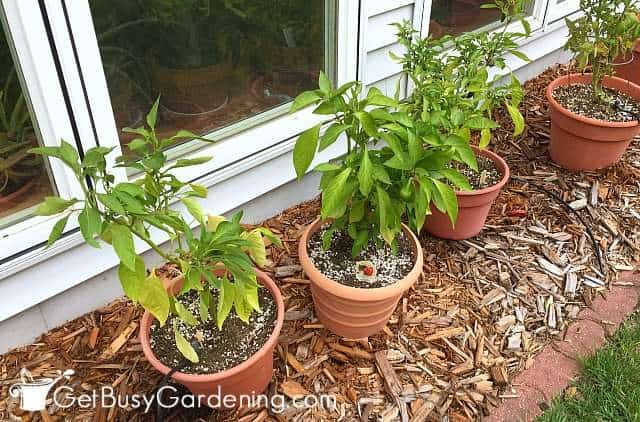
3 Methods For Overwintering Pepper Plants
There are three ways to overwinter pepper plants. You can mix and match to try the different methods to see which one works best for you.
It doesn’t matter if you have red, yellow, or green bell peppers, chilis, jalapenos, or ghost peppers, these methods for overwintering the plants will work with any variety.
- Potted peppers can be brought indoors as houseplants.
- The plants can be allowed to go dormant and be stored for winter.
- You can take cuttings of your plants, and overwinter those indoors.
How To Overwinter Pepper Plants
In this section, I will describe all three methods of overwintering pepper plants in detail. Some people find that one method is much easier for them. So, you should definitely experiment to find your favorite.
1. Overwintering Peppers Indoors
Contrary to popular belief, you can grow peppers indoors. If you want to try this method, then bring it inside before cold weather hits in the fall so it doesn’t start going dormant.
If your plant is too large to bring in, you can prune it to a smaller size. Keep in mind that since it’s is used to being outside, it will go into shock when you move it indoors.
It may droop for a few days, or even drop a few leaves. But this is normal, and it should pop back to health once it gets used to being inside.
2. Storing Dormant Pepper Plants
Some people find it much easier to allow the plants to go dormant in winter. To encourage your pepper plant to go dormant, leave it outside as long as you can in the fall.
Be sure to protect it from frost, or move it to a sheltered area. Allowing the plant to be exposed to cool temperatures will trigger dormancy.
I also recommend pruning off all the immature peppers, as well as the flowers and buds, and stop watering.
It may start dropping some leaves during this time, which is a good sign that it’s going into dormancy.
Once it’s too cold to leave them outside, you can move them inside to a cool, dark location. Eventually they will drop most, if not all of their leaves.
Throughout the winter, check on your dormant peppers, and gave them a little water here and there. Be sure to allow the soil to dry out between waterings, but never allow it to get completely bone dry.
Never overwater a dormant pepper plant either. Learn how to bring plants back out of dormancy in the spring without killing them.
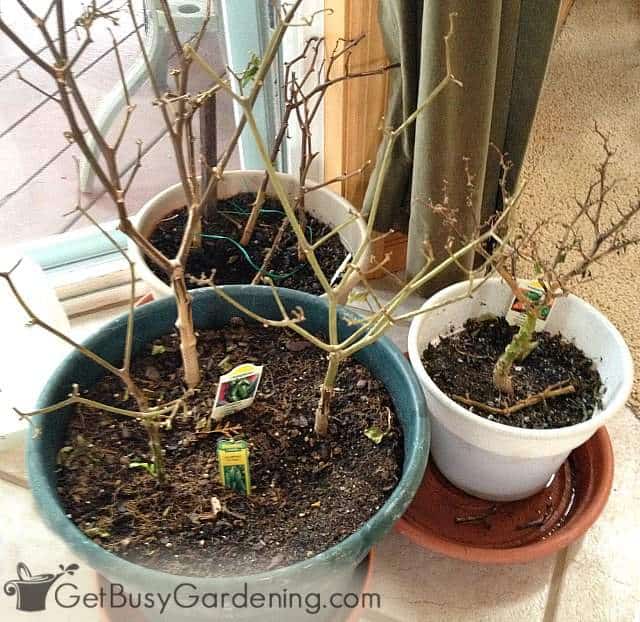
3. Bringing In The Cuttings
Rather than moving the whole plant inside, or digging it out of your garden, you can take cuttings instead. Be sure to take them before it gets cold, otherwise they may not root.
Use a propagation chamber to root them, or try putting them in water. Once your cuttings have grown healthy roots, then you can pot them up using a general purpose soil.
After they’re potted up, you can follow the same tips in this article for overwintering peppers as houseplants.
Related Post: How To Overwinter Hibiscus Plants Indoors
Bringing Pepper Plants Indoors For Winter
When you’re ready to bring your pepper plant indoors as the colder weather arrives, it’s important to do it at the right time. Follow these tips for best results.
When To Bring Pepper Plants Inside
Deciding when to bring your pepper plants inside depends on which overwintering method you will be using.
For live plants and cuttings, bring them in before the weather dips below 60°F (15.6°C). This is usually several weeks prior to your average first frost date in the fall.
If you’re planning to let them go dormant, you can wait until the temperature falls to as low as 40°F (4.5°C). But take care to protect them from frost.
How To Winterize Pepper Plants
Before moving your peppers indoors, you should debug them first. Follow these instructions for debugging before bringing plants in for the winter.
Otherwise, if you’re just bringing in cuttings, then you can debug them in the sink. Simply soak them for 10-15 minutes in water with a little bit of mild liquid soap in there to kill the bugs.
Be sure to weigh down the cuttings so they don’t float. Then rinse them well with fresh water before rooting them.
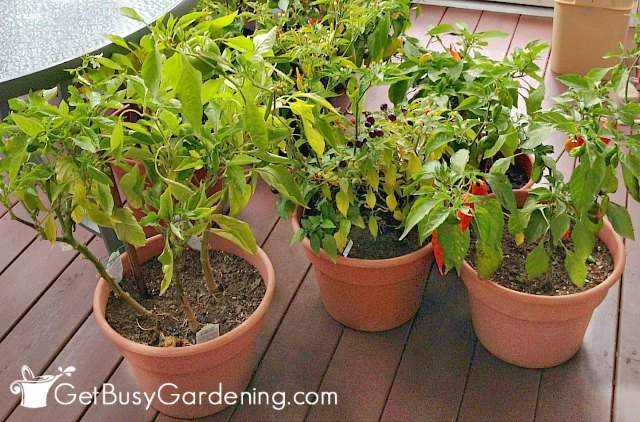
Tips For Keeping Peppers Indoors In Winter
Though they’re pretty easy to maintain indoors, they do require some special care to keep them healthy through the winter.
In this section, I’ll give you some tips for overwintering live pepper plants indoors.
And, if you keep them alive through the winter, you might even be rewarded with some fresh peppers!
Light
They need a lot of light, so put your plant in a sunny window at minimum. But usually even a south facing window isn’t enough for them during the winter.
So, if you notice it’s starting to get leggy, or it’s reaching for the window, then you’ll definitely need to give it more light.
I use a grow light that’s set on a timer to give my peppers 12-14 hours of light every day.
Water
Established peppers don’t need a lot of water, and they hate soggy soil. So be sure to allow the soil to dry out between waterings.
To prevent accidental overwatering, stick you finger one inch into the soil and only water it when it feels dry.
If you struggle give them the right amount of water, a moisture gauge probe is a great tool to use.
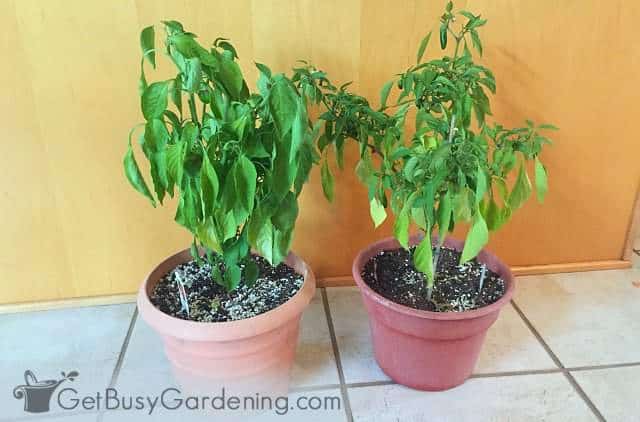
Controlling Pests
Dealing with bugs is probably one of the hardest parts about overwintering peppers inside. Aphids and spider mites love pepper plants, and can become a huge problem.
Fungus gnats can also become an issue when indoors (though they are just a nuisance, and don’t eat the leaves).
If you ever see any bugs, it’s best to act quickly to get rid of them before they have a chance to spread to your other plants.
You can wash the leaves with insecticidal soap (or mix your own using 1 tsp of mild liquid soap per liter of water), spray them with neem oil, or try horticultural oil.
FAQs
In this section I’ll address some of the most common questions I get about overwintering pepper plants. If you can’t find your answer, add it in the comments below.
How do I keep my pepper plants over winter?
The best way to keep your pepper plants over winter is to bring them indoors, and either grow them as a live plant or store them dormant.
Do you water peppers when overwintering?
Yes you should water peppers when overwintering them. You can water live plants a little less often than you would in the summer. For dormant ones, let the soil dry out before watering again.
Can you overwinter green peppers?
Yes, you can overwinter green peppers, or any other kind, like red, yellow, and purple bells, jalapenos, cayennes, chilies, etc.
Is it worth overwintering peppers?
It’s worth overwintering peppers because you’ll start with a mature plant rather than seedlings in the spring. Mature plants will start producing long before small starts will, and you might even get some fresh peppers during the winter.
How do you keep pepper plants alive in the winter?
You can keep pepper plants alive in winter by growing them as houseplants. Put them in a sunny window or add a grow light, slow down on watering, and don’t fertilize them all winter. Keep an eye out for bugs, and treat the plant immediately to prevent an infestation.
Where do you store overwintered peppers?
You can store overwintered peppers in a cool location that stays above freezing (around 40°F is ideal). A good storage place is in a basement or unheated garage.
Overwintering peppers is pretty easy, but it can be a bit of extra work. If you have the room, it’s worth the effort to keep your favorites year after year. Starting each spring with a mature plant means more peppers for you!
More Posts About Overwintering Plants
- How To Overwinter Sweet Potato Vines
- How To Overwinter Coleus Plants Inside
- How To Overwinter Brugmansia Plants
More Posts About Peppers:
- How To Prune Peppers For Maximum Production
- How To Can Peppers
- How To Preserve & Store Peppers Long Term
- How To Dry Peppers
- How To Make Red Pepper Flakes
Share your tips for overwintering peppers in the comments below.
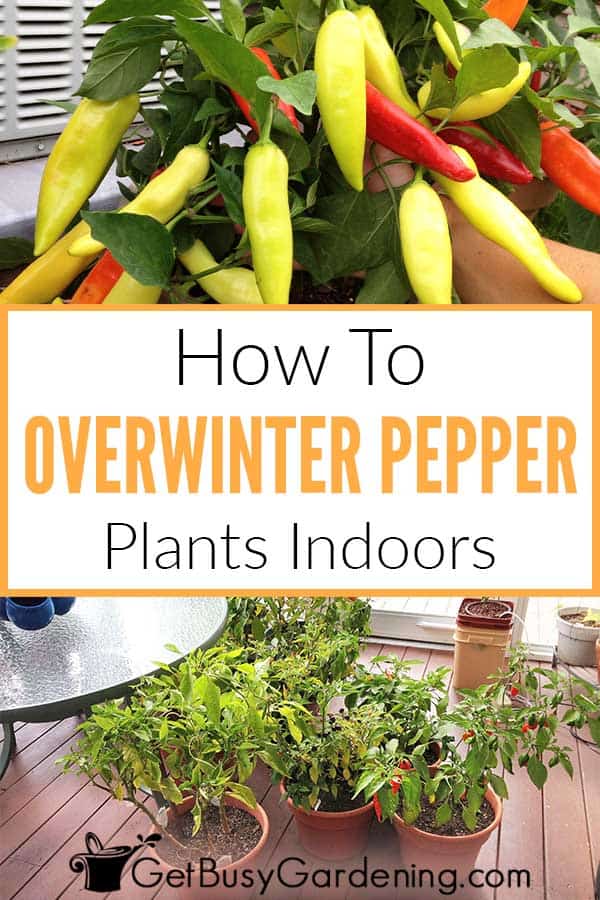
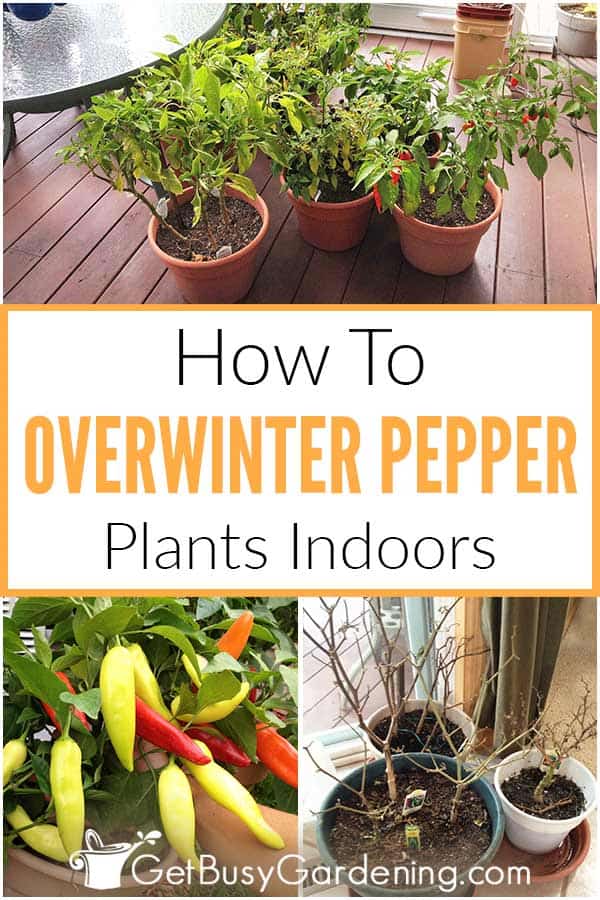
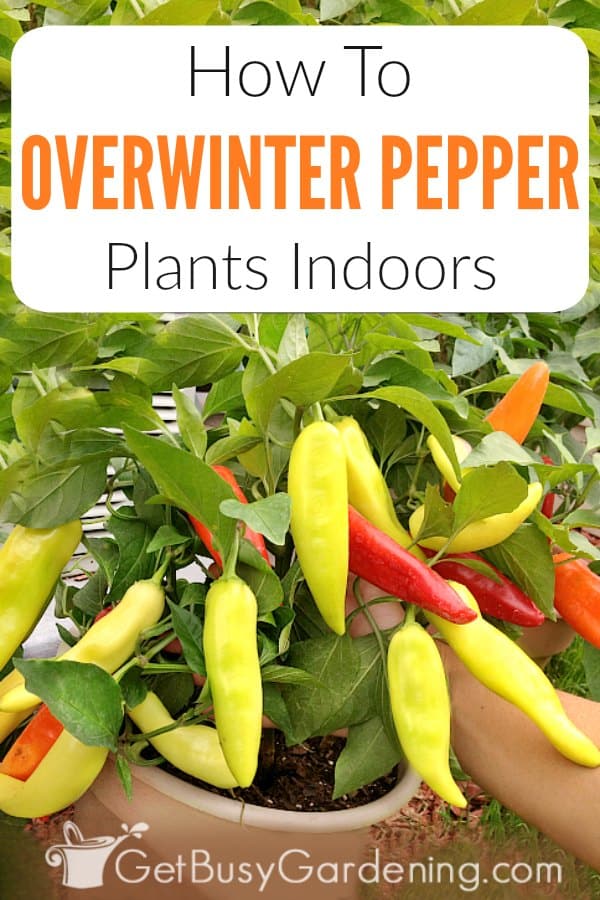


Jeff says
I’m overwintering peppers for the first time. Do I need to clip off leaves as they come or let them grow? I’m in Wisconsin. Thanks!
Amy Andrychowicz says
You can continue to let your pepper plants grow as long as you can provide them with plenty of light. Don’t prune them, or it can encourage weak winter growth. Wait until spring to do that. Otherwise if you want to try overwintering them dormant, then put them in a dark room and let the soil dry out more. In that cases, they will naturally drop their leaves.
Jeff says
Thanks for the reply!
Amy Andrychowicz says
You’re welcome!
Donna Skinner says
I don’t have any light in my garage. Would the pepper plant survive and which method should I use?
Thanks!
Amy Andrychowicz says
If you don’t have any light in your garage, then you’ll definitely need to store your pepper plants dormant over the winter. If you want to try keeping them alive, then you’ll need a warmer location and grow lights.
Michele says
Can you do this with eggplants?
Amy Andrychowicz says
Yes, you can definitely try overwintering your eggplants indoors too, they are perennials just like peppers are.
Debbie says
I live in Arkansas…mostly mild winters. If I leave or plant my potted pepper plants in the ground and use heavy mulch on them, will they come back next year?
Amy Andrychowicz says
Depending on where you live, it may be too cold to leave your pepper plants in the ground over winter. Most types are hardy down to zone 10, and some as cold as zone 9, as long as it stays above freezing all winter. If you’re in a lower zone, your pepper plants may survive in the ground during mild winters, or if they’re in a warm microclimate in your yard. You could try covering them and heavily mulching the rootball to see if you can get them to survive the winter outside.
Joan Taylor says
I would love to overwinter some of my plants but I live in an apartment and don’t have much space. Can I safely downsize my plants and make them smaller? Also does it work with potted tomato plants?
Amy Andrychowicz says
Whether or not you can safely cut back your plants before overwintering them definitely depends on what types you have. Tomatoes are annual plants, and they are extremely difficult to grow indoors, so I personally wouldn’t try overwintering them.
Coy L. Robinson Jr says
I have overwintered pepper plants that are starting to flower. Should I prune the flowers? They were brought in in September and it is the middle of December now. 3 of the 4 pepper plants are leaping very well and growing. The one jalapeno has dropped its leaves. They won’t go outdoors until May.
Amy Andrychowicz says
As long as your wintered pepper plant is healthy and growing, then you don’t need to prune the flowers. In fact, you can pollinate them yourself, and they might produce fruits! I’ve done this before, and was able to enjoy fresh peppers from my plants every now and then throughout the winter. Just use your finger to touch the inside of all of the flowers one after another, going back and forth a few times. It’s as easy as that!
Bridie says
Quick question: could you winter pepper plants in a greenhouse?
Amy Andrychowicz says
Yes, you could overwinter your pepper plants in a greenhouse as long as the temperature stays above 40F. If it’s an unheated greenhouse and the plants freeze, they won’t survive.
Paige says
I ended up flooding one of my container peppers last year and so I repotted it and let it sit.
I brought it in in September (short growing here too) and he has just steady kicked it all winter.
A few new leaves but otherwise no change. I have quiet a few houseplants so he just fits in but it’s quiet odd I guess.
? was hoping somebody had a clear answer on why and how although people keep coleus as a houseplant and it is an outdoor annual.
Amy Andrychowicz says
Sorry but I’m not sure what your question is. Are you having issues with your pepper plant?
James says
Is your utility closet totally dark? If that’s the case I would try bringing a few dozen inside with me!
Amy Andrychowicz says
Yes, it’s pretty dark in there. No windows, but the door stays open so there is a tiny bit if light. Good luck if you try overwintering your peppers. Come back to let us know how it works for you! 🙂
James says
This is some exciting news. Thank you for sharing! I will be trying it this fall. The real challenge will be remembering to report back.
Amy Andrychowicz says
You’re welcome!! Good luck.
Julie says
I would LOVE to have over wintered pepper plants. I basically have been doing that with my stevia plant (by accident) so it would just have a buddy. I agree it's annoying to put your peppers to bed when they just start really growing here!
Amy Andrychowicz says
I never thought to try to keep stevia through winter before, that's a great idea. I just need to find more space in the house!
PlantPostings says
Overwintering peppers is a great idea! Sounds very promising.
Amy Andrychowicz says
Thanks! Hope you’ll give it a try.
Jennah Watters says
I have a good friend who was overwintered a yellow bell pepper plant for like 4 years now. The plant is now "she" and is a loved member of the family! lol. I should take pics for a guest blog next time I'm up there! She says it gives her the best peppers ever.
Amy Andrychowicz says
Wow, that is fantastic. Does she grow her pepper plant as a houseplant under lights, or does she allow it to go dormant? I would love to see pictures.